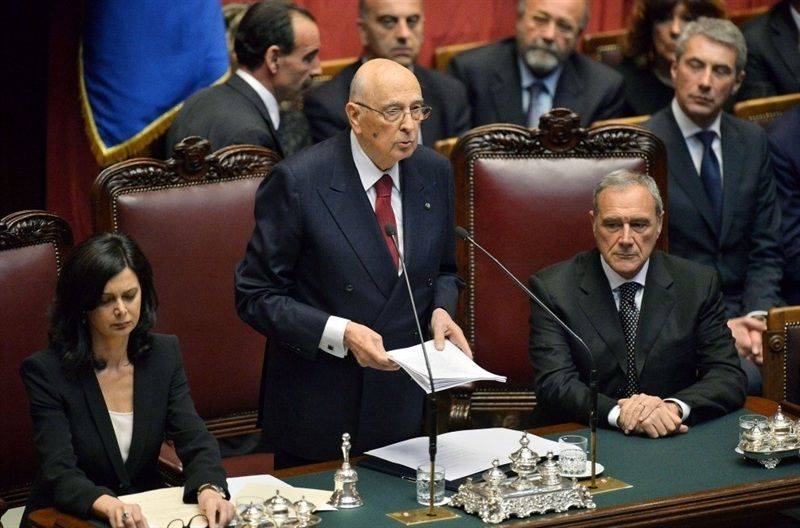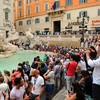Giorgo Napolitano Fights the "Fatal Deadlock"
ROME - Italy, but not only Italy, heaved a sigh of relief with the reconfirmation Monday at 5 pm of Giorgio Napolitano, in his 88th year elected to a second seven-year term as president of Italy. His re-election concludes the most fraught of the twelve presidential elections since the birth of the Republic out of the ashes of Fascism and war. Napolitano's reconfirmation is firmly within the framework of the Italian Constitution. But in the background the raucous leader of the new left in Italy, Beppe Grillo, who is backed by a quarter of the voters, has called the re-election a putsch and warned that he will, if he desires, bring a million angry Italians into the piazzas.
Otherwise there was a generalized sigh of relief, even though concerns remain that this year's Italian political debacle is far from over. Napolitano himself, openly moved and with breaking voice, was outspoken in warning against the risks the country continues to run. In his address to the Parliament after his swearing in, he called for talks to begin immediately for creation of a new government. Two months have passed since a national general election brought three warring factions - at this point to call them "parties" is almost inappropriate - into a "fatal deadlock," in Napolitano's words. Implicitly warning that new elections will be the result of failed negotiations for a new government, he also admonished the political leaders of the risk of "ungovernability, at least for this legislature." Unless reform measures, including a revision of the present electoral law are enacted, he threatens to resign, a move that would be deeply convulsive.
But what will come next is uncertain. Napolitano is urging a broad coalition government - "una politica delle larghe intese" - in the larger interest of the nation. It could be a government with full political authority or another babysitter cabinet of technocrats on the lines of that of the economist Mario Monti, which has held power since November 2012. If the former, it will ratify the splintering of Pier Luigi Bersani's Partito Democratico (which is likely to happen at any rate). But some commentators today are saying that the same men and women who stood up in Parliament in joint session to applaud Napolitano's words are precisely those who will sit on their hands stubbornly and try to reproduce more of the same rigid, vieux jeux politics which brought the country to the present sorry pass.
The concerns go beyond Italy itself. As European leaders point out, a politically and economically weak Italy is of generalized concern because unable to act as a counterpoise within Europe to German power. On the bright side, the spread, or cost of borrowing, dropped with the news of Napolitano's re-election since no one expects a government he might appoint to ignore its financial responsibilities within the European framework.
Beppe Grillo is now considered to stand on the farthest left point of the Italian political spectrum with his demands for a guaranteed minimum wage for all citizens and improved public health system and schooling. Few would argue that the latter two are worthy goals, but the idea of promising a generous minimum wage for everyone, at a time when the economy is weak and immigrants from desperately poor countries continue to pour into Italy, is so unrealistic as to appear either idiotic or cynical, and no one considers Grillo an idiot. In political terms, Grillo rejects the concept of the "inciuccio," which translates literally into the piglets all sucking together at the teats of a big sow. What he will do, how his members of Parliament will vote, is fairly predictable: they will follow his orders to continue a blanket opposition. But the implication is that, for the good of the nation, the splintered Partito Democratico will have to make an uneasy coalition with Berlusconi.
If so, there is great interest in who will be minister of Justice because of former Premier Silvio Berlusconi's ongoing scuffles with the judiciary, which he accuses of persecution. This will be a key ministry in any future government, and if Berlusconi is not satisfied with the nomination, there is the risk that he will, through his circa one-third of Parliament, throw out the government baby with the bath water. This would throw the country into the upheaval of another general election, whose outcome is absolutely and ominously unpredictable.
The leadership of the Partito Democratico is in a state of shock. Its older and newer leaders like Matteo Renzi and his young Turks are at war with each other after the debacle of Bersani's attempts to have his candidate elected president. That the party is dead in the water is apparent, and press reports are that Massimo D'Alema is shifting his power base toward Renzi. Already some are calling for Renzi himself to become premier of the sort of larger coalition Napolitano is promoting, as well as head of a new British-style Labour party, to be called the Partito del Lavoro, a splinter of the woebegone, splintered Partito Democratico which Pier Luigi Bersani led from strength to disgrace.





































i-Italy
Facebook
Google+
This work may not be reproduced, in whole or in part, without prior written permission.
Questo lavoro non può essere riprodotto, in tutto o in parte, senza permesso scritto.